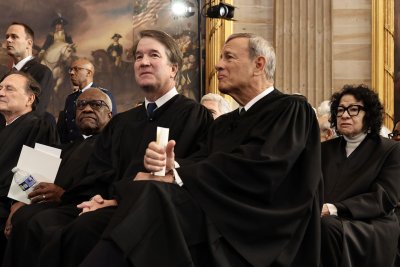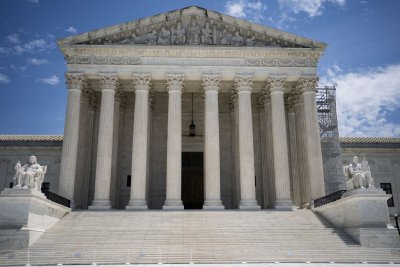Supreme Court poised to rehear voting rights case

Aug. 12 (UPI) — The U.S. Supreme Court is preparing to rehear a case that will have implications on the Voting Rights Act when its next term begins in October.
The high court posted an order in the case Louisiana vs. Callais on Aug. 1, directing the parties involved to file supplemental briefs. The court heard arguments in the case in March but did not hand down a decision, setting the stage for reargument at a later date.
Louisiana vs. Callais is a case over redistricting Louisiana’s congressional map.
There are six congressional districts in Louisiana. The state legislature passed a redistricted map in 2024 that included two districts where a majority of voters are Black: District 2 and District 6, represented by Rep. Troy Carter and Rep. Cleo Fields respectively.
Fields, a Democrat from Baton Rouge, was elected to represent the second majority Black district in 2024.
About one-third of Louisiana’s population is Black, reflected in the newly-drawn congressional map.
The plaintiffs, a group of voters in Louisiana, argue that race was the prevailing consideration in redistricting, violating the Equal Protection Clause of the 14th Amendment of the U.S. Constitution.
Stuart Naifeh, manager of the Redistricting Project at the NAACP Legal Defense and Educational Fund, argued the case in favor of the map before the Supreme Court in March. He told UPI that fair representation is at stake in this case.
“It’s not about proportional representation,” Naifeh said. “It’s about places where unless you create a district to provide an opportunity to have representatives of your choice a particular group will not have a fair opportunity to do that because of the race-infused politics that exist in those places.”
The issue at hand in Louisiana vs. Callais, according to Naifeh, is whether the redistricting map adopted in January 2024 is a remedy to a Voting Rights Act violation or if it is itself racial gerrymandering as plaintiffs claim.
“The question that they asked us to brief is somewhat general. In some ways it’s asking us to rebrief the same issue,” Naifeh said. “But then it refers to a specific section of the plaintiff’s brief where they argue, at least in Louisiana, that Section 2 of the Voting Rights Act can no longer be applied without violating the Constitution.”
“So you can’t draw a second majority-Black district without violating the Constitution, is the argument that they have made,” he added.
The Voting Rights Act, passed in 1965, represents a key victory for Civil Rights advocates. It was passed to address racial discrimination in voting. Section 2 prohibits discrimination in voting policies and procedures on the basis of race, color or minority status.
The previous version of the congressional map, drawn in 2020, included just one majority-Black district. That map was determined to have violated the Voting Rights Act because it diluted the role of Black voters in electing representatives.
Former Gov. John Bel Edwards vetoed that map in 2022 but the Republican-led legislature held a special session to override his veto.
The NAACP Legal Defense Fund and a group of voters then filed a complaint to challenge the map, arguing that it was an instance of unconstitutional gerrymandering.
A federal judge ruled in favor of the NAACP and co-plaintiffs but their ruling was blocked by the U.S. Supreme Court. It put enforcement of the federal judge’s decision on hold as another redistricting case was mulled by the high court Allen vs. Milligan.
The Allen vs. Milligan case was based on a congressional redistricting plan out of Alabama in which a majority of Black voters were placed into a single district, using a “race-neutral benchmark” theory and “modern computer technology” to draw its congressional map.
Plaintiffs argued that this plan, like the 2020 redistricting plan in Louisiana, violated Section 2 of the Voting Rights Act.
The Supreme Court ultimately ruled 5-4 in favor of Black voters in Alabama and subsequently Louisiana. Chief Justice John Roberts wrote the majority opinion, joined in part by Justice Brett Kavanaugh and the court’s three liberal judges.
In Roberts’ opinion, he noted that there is sometimes difficulty in discerning between “racial predominance” and “racial consciousness.”
“When it comes to considering race in the context of districting, we have made clear that there is a difference ‘between being aware of racial considerations and being motivated by them,'” Roberts wrote. “The former is permissible; the latter is usually not. That is because ‘[r]edistricting legislatures will — almost always be aware of racial demographics,’ but such ‘race consciousness does not lead inevitably to impermissible race discrimination.'”
Naifeh highlights Kavanaugh’s partial concurrence with the majority opinion as a key factor in redistricting cases going forward, including Louisiana vs. Callais.
Kavanaugh agreed with the minority opinion of Justice Clarence Thomas that while “race-based redistricting” may be required in some circumstances, it should not continue indefinitely.
“The authority to conduct race-based redistricting cannot extend indefinitely into the future,” Kavanaugh wrote. “But Alabama did not raise that temporal argument in this Court, and I therefore would not consider it at this time.”
A victory for Naifeh, the NAACP and Black voters in Louisiana does not rely solely on the proposed congressional map remaining intact, Naifeh said.
“Victory, for Black voters in Louisiana in particular, is that they continue to have the opportunity to elect candidates of choice and are not shut out of having a voice in the political process on account of race, which was the situation until the state adopted this new map,” he said. “We don’t see victory as meaning the state keeps this particular map.”
Looking beyond Louisiana vs. Callais, Naifeh notes that race continues to be a “salient factor” in elections across the country. It remains a motivator in political platforms and civic engagement.
“We still have parts of this country where race is a very salient factor in elections and it’s not because of the Voting Rights Act,” Naifeh said. “Where race is still such a salient part of the electoral process we continue to need the Voting Rights Act. That’s what it was designed to address. So I worry that we will have a country where race is still such a salient part of elections and there is no remedy. The court needs to recognize that race continues to play a role in elections in many places.”




